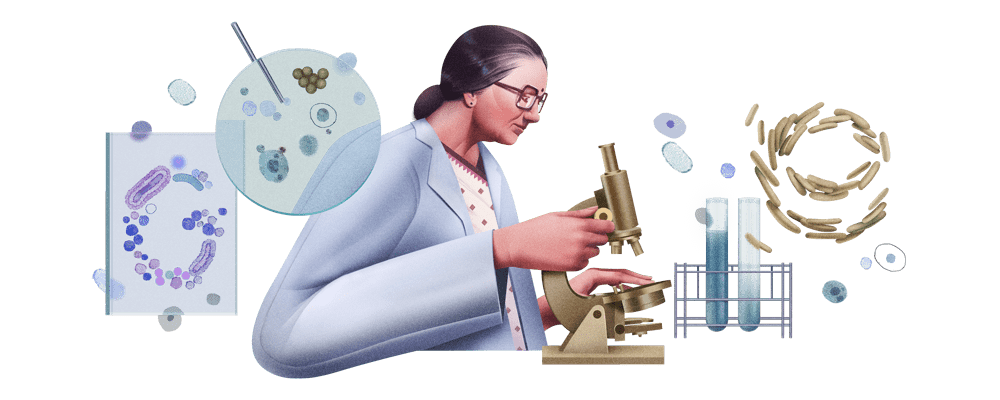Dr. Kamal Ranadive’s 104th Birthday : Google Doodle celebrates Dr. Kamal Ranadive Birthday
Kamal Ranadive, née Kamal Jayasing Ranadive (8 November 1917 – 2001) was an Indian biomedical researcher who is known for her research in cancer about the links between cancers and viruses. She was a founder member of the Indian Women Scientists’ Association (IWSA).
In the 1960s, she established India’s first tissue culture research laboratory at the Indian Cancer Research Centre in Mumbai
Kamal was born in Pune on 8 November 1917. Her parents were Dinkar Dattatreya Samarath and Shantabai Dinkar Samarth. Her father was a biologist who taught in the Fergusson College, Pune.[1] He ensured that all his children were well educated. Kamal was a bright student. She had her schooling at the Huzurpaga: the H.H.C.P. High School
Professional career
Kamal, on her return to India, rejoined ICRC and started her professional career as a Senior Research Officer. She was instrumental in establishing Experimental Biology Laboratory and Tissue Culture Laboratory in Bombay. From 1966 to 1970 she had assumed the mantle of the Director of the Indian Cancer Research Centre in an acting capacity. In the early 1960s, she along with her assistants (whom she had inducted into ICRC) in the fields of biology and chemistry, developed tissue culture media and related reagents.
https //jeevanpramaan.gov.in Portal : Generate Digital Life Certificate for Pensioners
She was also responsible for establishing new research units in Carcinogenesis, Cell biology and Immunology. Her career achievements include research on the pathophysiology of cancer through the medium of animals which led to a further appreciation of causes of diseases such as leukaemia, breast cancer and Esophageal cancer. Another notable achievement was in establishing a link to the susceptibility of cancer and hormones and tumour virus relationship.
Evolution of the leprosy vaccine was a result of her basic research on the bacteria related to leprosy. She was a great inspiration to Indian women scientists to work on cancer research, in particular on the subject cancer among women and children. One such project was on “Immunohematology of Tribal Blood” related to study of infants.
Awards
Kamal was awarded the Padma Bhusan (the third highest civilian award) for Medicine, in 1982. She was awarded the first Silver Jubilee Research Award 1964, of the Medical Council of India. This award included a gold medal and a cash award of Rs.15,000. She was also awarded the G. J. Watumull Foundation Prize for 1964 in micro-biology.
She was an Emeritus Medical Scientist of the Indian Council of Medical Research
TN 11th Supplementary Result 2021 @ dge.tn.gov.in – Download Marks Card and Details
Google Doodle celebrates Dr. Kamal Ranadive Birthday
Today’s Doodle, created by guest artist Ibrahim Rayintakath from India, commemorates the 104th birthday of Indian cell scientist Dr. Kamal Ranadive. In addition to her remarkable cancer research, Ranadive is most known for her dedication to create a more equal society via science and education.

His real name is Kamal Samarath, but he is best known as Kamal Ranadive. Ranadive’s father had encouraged her to seek a medical degree, so she did well in school, but she eventually discovered that biology was her true passion. While working as a researcher at the Indian Cancer Research Center, she earned her PhD in cytology, the study of cells, in 1949. (ICRC). When she returned to Mumbai (then Bombay), she founded the country’s first tissue culture laboratory at the International Committee of the Red Cross (ICRC).
Dr. Ranadive was one of the first researchers in India to propose a relationship between breast cancer and heredity, as well as establish correlations between cancers and certain viruses while serving as director of the ICRC and pioneer in animal modelling of cancer development. Ranadive continued his pioneering work by studying the organism that causes leprosy, Mycobacterium leprae, and helping to produce a vaccine. The Indian Women Scientists’ Association (IWSA) was created in 1973 by Dr. Ranadive and 11 of her colleagues to assist women in science.
He urged Indian students and intellectuals living outside of India to return to their homelands and use their knowledge to benefit their own communities. When Dr. Ranadive retired in 1989, she continued to work in Maharashtra’s rural villages, educating women to be healthcare providers and teaching people about nutrition and health. 11 chapters have been established in India by the International Women’s Scientific Association (IWSA). The legacy of Dr. Ranadive’s commitment to health justice and education is still felt by her students today.
Be the first to comment